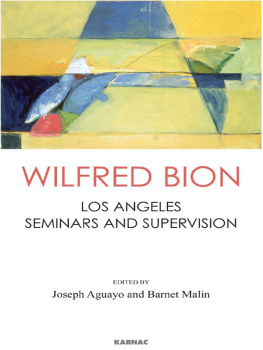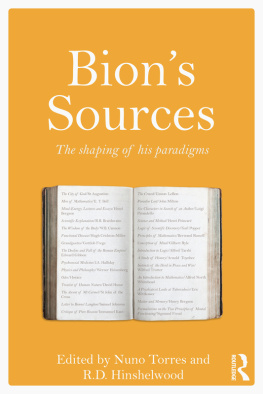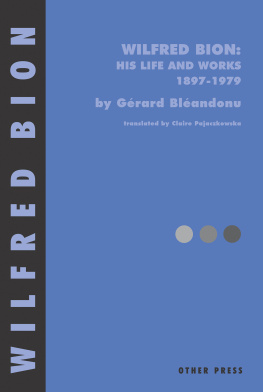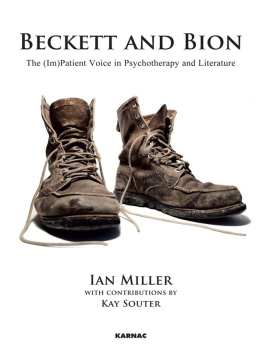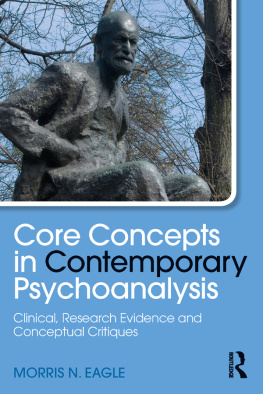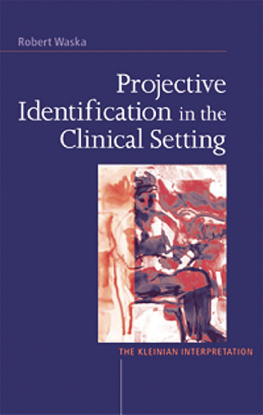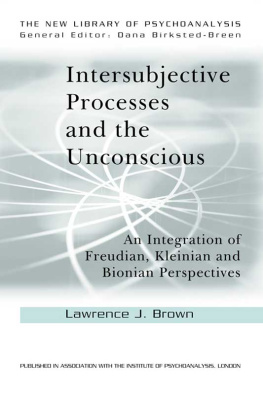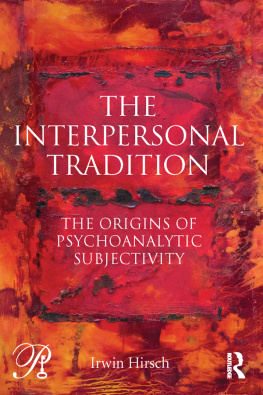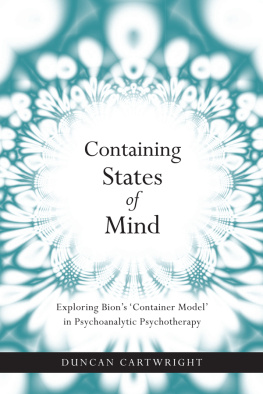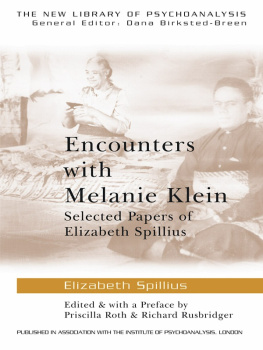WILFRED BION: LOS ANGELES SEMINARS AND SUPERVISION
Edited with an Introduction by Joseph Aguayo and Barnet D. Malin
KARNAC
First published in 2013 by
Karnac Books Ltd
118 Finchley Road, London NW3 5HT
Copyright 2013 to Joseph Aguayo and Barnet D. Malin.
The right of Joseph Aguayo and Barnet D. Malin to be identified as the authors of this work has been asserted in accordance with 77 and 78 of the Copyright Design and Patents Act 1988.
All rights reserved. No part of this publication may be reproduced, stored in a retrieval system, or transmitted, in any form or by any means, electronic, mechanical, photocopying, recording, or otherwise, without the prior written permission of the publisher.
British Library Cataloguing in Publication Data
A C.I.P. for this book is available from the British Library
ISBN 978 1 78049 194 3
Edited, designed and produced by The Studio Publishing Services Ltd
www.publishingservicesuk.co.uk
e-mail:
Printed in Great Britain
www.karnacbooks.com
ACKNOWLEDGEMENTS
Barnet D. Malin
Joseph Aguayo kindly suggested that I write the acknowledgments for this volume. We must first acknowledge and thank Francesca and Nicola Bion, who kindly granted us permission to publish these transcripts. However, we would not have had these seminars and the supervision today had it not been for my father, Arthur Malin, and he deserves our greatest acknowledgment for making this project possible.
Art Malin, being the eager student he has always been, brought a tape recorder along to these seminars and to the group supervision. The sound quality of these forty-six-year-old tapes is remarkably good. Bion's words and the participants comments and questions sound absolutely vital and fresh, both from the audio and the intellectual perspectives.
We all owe my father a profound debt of gratitude for making and keeping these tapes, which are now held in the Arthur Malin Audio Archives.
In addition to their value as archival Bion material, these recordings register part of the history of psychoanalysis in Los Angeles. They demonstrate a welcoming attitude, open curiosity, and vigorous, respectful debate between analysts holding very different perspectives. We therefore acknowledge with deep gratitude James S. Grotstein along with Art Malin for their ongoing efforts to learn of and study new ideas. These two men did soand continue to do sonot only with words but also with actions: by forming their study group to broaden their psychoanalytic horizons, bringing British Kleinian analysts to Los Angeles to teach them, becoming outstanding and lauded teachers themselves, and finally, though they went in different directions, by rethinking and adding to psychoanalytic theory and practice, always doing so in open dialogue with the psychoanalytic world around them.
We had so many citations of personal communication from both of them for the introduction that we wish simply to acknowledge them all here. And we especially extend our deep appreciation to James Grotstein for many years of riveting, informing, and thought-provoking discussions about his former analyst and mentor, Wilfred Bion.
We also thank Mark Lindon, JD, for his permission to reprint the complete article based on Bion's paper Notes on memory and desire from The Psychoanalytic Forum, which was edited by his late father, John A. Lindon, MD.
Finally, I would like to thank my colleague and friend, Joseph Aguayo, for his efforts in making this undertaking happen. His enthusiasm and energy fuelled the entire project.
ABOUT THE EDITORS
Joseph Aguayo holds UCLA doctorates in both Clinical Psychology and Modern European History. A training and supervising analyst at the Psychoanalytic Center of California, he is in full-time private practice in West Los Angeles. A recipient of a number of research fellowships from the International Psychoanalytic Association's Research Advisory Board, he has merged his clinical and research interests through numerous publications in the history of Kleinian and Bionian psychoanalysis. He has published numerous papers from 1997 to 2011 in the International Journal of Psychoanalysison Klein's evolution of child analysis in the context of both controversial and collaborative relationships with Anna Freud and D. W. Winnicott; the publishing cohort of Rosenfeld, Segal, and Bion on the treatment and understanding of psychotic states of mind; and the here and now contemporary Kleinian technique of Betty Joseph. His most recent publication, Wilfred Bion's Caesura: From Public Lecture to Published Text appears in L. Brown and H. Levine, (Eds.) (2013) Growth and Turbulence in the Container/Contained (Routledge).
Barnet D. Malin, MD, is a training and supervising analyst at the Psychoanalytic Center of California and the New Center for Psychoanalysis in Los Angeles, CA. He is an associate professor of psychiatry and bio-behavioural sciences at UCLA. Dr Malin teaches extensively in these organisations and has lectured at other psychoanalytic and psychiatric programmes nationally. He has authored papers on topics including relationships between shame, envy, and rage; the use of medication in psychoanalysis; the Kohutian and Lacanian mirror stage, and others. He was the recipient of the 1995 Karl Menninger Memorial Award given by the American Psychoanalytic Association. Dr Malin lives and practices in Santa Monica, CA.
FOREWORD
James S. Grotstein
To hear Wilfred Bion's voice again is to be overcome with so many feelings, so many thoughts, so many waking dreams. Bion was my analyst, and I shall never gossip about him. But to hear and read his ideas again as he spoke them in their moments of creation is to reaffirm his depth as a theorist, a compassionate clinician, and a person. These transcripts are precious for many reasons, perhaps mostly because they document a transformational moment in Bion's life and thinking. He was in the throes of creation and extension of his new ideas on the very nature of psychoanalysis itself, and he was considering uprooting his life at home to come to the foreign land of California at the height of the Western cultural insurrection of the late 1960s. Bion was courageous in accepting both challenges, just as he had been throughout his traumatic and rich life. These transcripts show us a man who, like Freud, was unafraid to revise everything he thought he knew in the ever-evolving search for truth. They show us Bion wrestling with his ideas on memory, desire, O, K, and F, and nowhere else has Bion revealed at such great length his clinical understanding of case material. Bion often stated, The analyst cannot be less important in an analysis or felt to be more important. These transcripts show us the man I remember so well.
Introduction
Joseph Aguayo and Barnet D. Malin
The bustling cottage industry of Bion studies in the new millennium includes considerable interest in the numerous clinical seminars given by Bion, primarily in North and South America (Bion, 1980, 1987, 1990). Wilfred Bion gave four seminars and a group supervision to members of the Los Angeles Psychoanalytic Society and Institute and interested others in April 1967. The editors recovered tape recordings of these presentations. With the permission of their owner (The Arthur Malin Audio Archives, owned and administered by the Psychoanalytic Center of California), the tapes were digitally copied and then transcribed by the editors. This archival material reflects the period during which Bion extended the epistemological research comprising his late period of thought.

